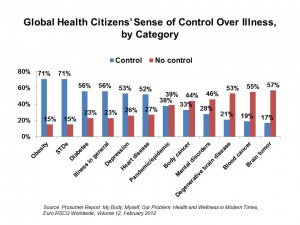 Every patient carries her or his doctor inside, said the great Renaissance man, Albert Schweitzer. Based on Euro RSCG Worldwide’s Prosumer Report – My Body, Myself, Our Problem: Health and Wellness in Modern Times, health citizens globally have begun to take on Dr. Schweitzer’s vision.
Every patient carries her or his doctor inside, said the great Renaissance man, Albert Schweitzer. Based on Euro RSCG Worldwide’s Prosumer Report – My Body, Myself, Our Problem: Health and Wellness in Modern Times, health citizens globally have begun to take on Dr. Schweitzer’s vision.
Clement Boisseau of Euro RSCG points out that people, globally, are fairly schizophrenic when it comes to thinking about empowerment over illness: check out the chart for perceptions by condition and disease state. Boisseau says that people perceive health today both in modern terms (such as feeling empowered to control some conditions), and archaic or “magically thinking” when it comes to power over genetic-based conditions.
The table shows that people feel most influential over obesity, sexually transmitted diseases, diabetes, depression, and heart disease. Fewer people feel a sense of control over pandemics and epidemics, cancers, mental health, and brain diseases.
The portmanteau “prosumers” probably came from Alvin Toffler, who wrote FutureShock in the 1970s, to contract the words “proactive consumers.” Euro RSCG uses the term to mean activated consumers, culturally and socially aware, taking active roles in choosing products and services. This translates into healthcare as being an engaged patient or caregiver.
A key finding in this survey is that prosumers the world over are taking a multipronged approach to managing their health, especially tapping into social networks for help in reducing medical costs. Health citizens are connecting the dots between health and personal finance: the least healthy people are those most vulnerable to the economic downturns felt around the world. Consumers overall are making health care decisions based on both efficacy and personal cost.
Health Populi’s Hot Points: I love that Euro RSCG riffed on the classic women’s health book title, Our Bodies, Ourselves, for this report, with the extra tagline, “Our Problem.” This speaks to personal health in aggregate translating to public health, and civic responsibility.
Health care is seen more as a communal matter than a personal one, Euro RSCG writes. I could not agree more. While their research finds that people are hungry for more personal responsibility, they see interconnectedness when it comes to health. One aspect of this is the health and safety of the local food chain, where most people are aware of the nutritional health value of food they eat than they used to be (except in the Czech Republic, but 65% of people globally).
This is also about people-consumers relating to brands and products they trust to help project-manage their health. All industries must engage with health in some way now, which we learned from the Edelman Health Barometer and is reinforced by Euro RSCG in this report.
Euro RSCG concludes by asking health citizens what we’re willing to pay – with our bodies, our cultures, and our social communities – for modern conveniences and breakthroughs. Can we rely on, and return to, “Eastern” traditional approaches to health and mindfulness to battle many of the conditions over which we want control? For some prosumers, that will be a Back to the Future scenario, Euro RSCG says.
We must carry our own doctor with us inside.




 Interviewed live on BNN Bloomberg (Canada) on the market for GLP-1 drugs for weight loss and their impact on both the health care system and consumer goods and services -- notably, food, nutrition, retail health, gyms, and other sectors.
Interviewed live on BNN Bloomberg (Canada) on the market for GLP-1 drugs for weight loss and their impact on both the health care system and consumer goods and services -- notably, food, nutrition, retail health, gyms, and other sectors. Thank you, Feedspot, for
Thank you, Feedspot, for  As you may know, I have been splitting work- and living-time between the U.S. and the E.U., most recently living in and working from Brussels. In the month of September 2024, I'll be splitting time between London and other parts of the U.K., and Italy where I'll be working with clients on consumer health, self-care and home care focused on food-as-medicine, digital health, business and scenario planning for the future...
As you may know, I have been splitting work- and living-time between the U.S. and the E.U., most recently living in and working from Brussels. In the month of September 2024, I'll be splitting time between London and other parts of the U.K., and Italy where I'll be working with clients on consumer health, self-care and home care focused on food-as-medicine, digital health, business and scenario planning for the future...